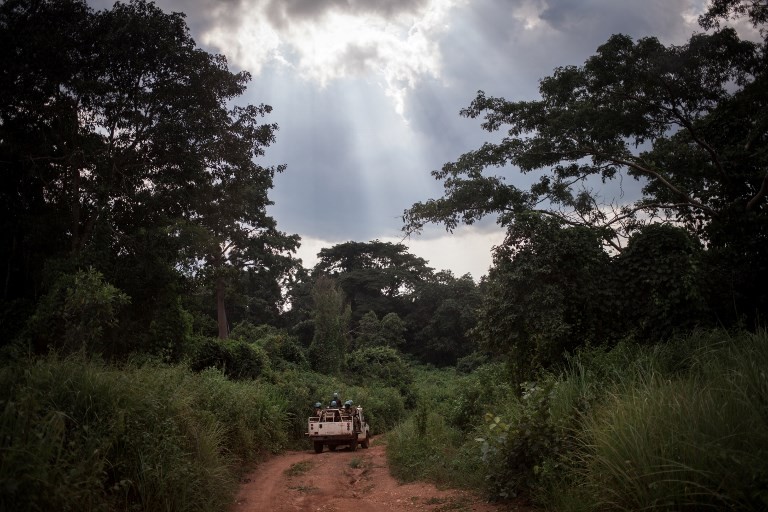Popular Reads
Top Results
Can't find what you're looking for?
View all search resultsPopular Reads
Top Results
Can't find what you're looking for?
View all search resultsThree Russians 'carrying press cards' killed in Central Africa
Three Russians carrying press cards have been killed in the troubled Central African Republic (CAR), Russia's foreign ministry said Tuesday.
Change text size
Gift Premium Articles
to Anyone
 Tanzanian soldiers from the UN peacekeeping mission in the Central African Republic (MINUSCA), patrol the town of Gamboula, threatened by the Siriri group, on July 6, 2018. Known as Siriri, the force is drawn mainly from Fulani cattle herders, who say they took up arms to deal with rustlers. Cattle theft is frequent in the west of the country, where seasonal migration of livestock is common practice. Led by an individual named Ardo Abba, Siriri ( (AFP/Florent Vergnes)
Tanzanian soldiers from the UN peacekeeping mission in the Central African Republic (MINUSCA), patrol the town of Gamboula, threatened by the Siriri group, on July 6, 2018. Known as Siriri, the force is drawn mainly from Fulani cattle herders, who say they took up arms to deal with rustlers. Cattle theft is frequent in the west of the country, where seasonal migration of livestock is common practice. Led by an individual named Ardo Abba, Siriri ( (AFP/Florent Vergnes)
Three Russians carrying press cards have been killed in the troubled Central African Republic (CAR), Russia's foreign ministry said Tuesday.
"According to information received on July 30 (Monday), three people were killed not far from the town of Sibut, 300 kilometers (185 miles) north of Bangui," the ministry said in statement.
It added that the bodies had been transported to the capital.
A judicial source told AFP the men were "assassinated by unknown gunmen" at a roadblock.
"They were driving back from (the northern town) of Kaga Bandoro," a religious source added.
Although the foreign ministry said the trio were carrying press cards, a Russian security official reached in Bangui said representatives in the CAR were not aware of the presence of any journalists from Russia.
Rich in minerals, including uranium, the CAR is one of the poorest and most unstable countries in the world.
It plunged into violence after longtime leader Francois Bozize, a Christian, was overthrown in 2013 by a mainly Muslim rebel alliance.
Former colonial ruler France intervened militarily to push out the alliance before winding down the operation.
But President Faustin-Archange Touadera, Bozize's elected successor, controls little of the country beyond the capital Bangui.
He governs with the support of a United Nations force of 13,000 troops and police, one of the biggest peacekeeping missions in the world.
Most of the CAR is controlled by 15 militias, many of which claim to represent Christian or Muslim communities but frequently clash over natural resources and revenue, which includes roadblocks.
Assaults on peacekeepers and aid workers have been frequent, but there has been no known attacks on Russians in recent memory.
- Arms race -
Historically, the major player in the CAR has been France, but Russia has taken on a visible role since December last year, when it was authorised by the UN to provide the CAR armed forces with weapons and training.
The delivery was ostensibly aimed at shoring up the beleaguered central government and its chronically weak military -- an exemption to a UN arms embargo imposed at the outbreak of conflict in 2013.
Britain, France and the United States voiced concern, demanding that deliveries be restricted to light arms and that Russia take steps to provide traceability to prevent the weapons from being sold on the black market.
A UN panel of experts on Tuesday warned that Russia's weapons supply has sparked an arms race in the rampantly unstable country, with rebels turning to traffickers in Sudan for fresh gun shipments.
The rebel factions "believe that the government is preparing for a war against them", said the report sent to the Security Council last week.
Russia is also believed to have signed a range of deals with the government since then, including security for Touadera. His security advisor is also a Russian.
In May, Touadera met President Vladimir Putin at an economic gathering in St. Petersburg, where he thanked the Russian leader for Moscow's help during "a difficult humanitarian situation" and "in the process of the country's consolidation and reconciliation".
In early July, Russia tried to set up a meeting in Sudan to mediate between the government and the militias, government sources say.
Touadera's office said the Russian initiative was dropped as "the head of state believes there is no cause to engage in other processes while the African Union one is still under way."









